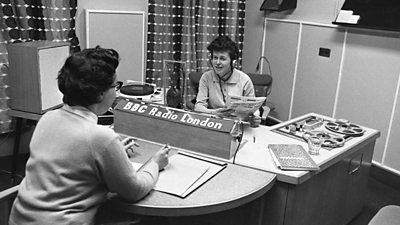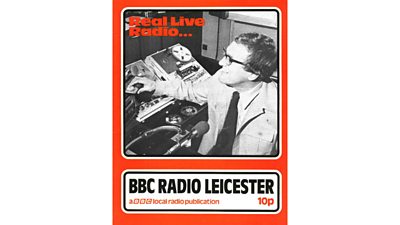BBC Radio began as a local broadcaster in 1922, as a national network was technically impossible until the BBC long wave transmitter at Daventry came into service in July 1925. Dr Matthew Linfoot, Principal Lecturer in Radio, Audio & Podcasting, University of Westminster, explores the origins of local broadcasting in the UK.
BBC radio can trace its local roots back to the early days of the organisation in the 1920s. Originally the British Broadcasting Company oversaw a network of local, separate stations, which were connected to London by telephone links and 'simultaneous broadcasting' (or networking as it would be called today).
These nine stations were based in London, Manchester, Birmingham, Newcastle, Glasgow, Cardiff, Aberdeen, Bournemouth and Belfast. Each station covered about twenty miles in radius – although the exact distance depended whether one was listening on a valve or crystal set. The focus was very much on showcasing local talent.
However, as the Company became a Corporation these early local stations were gradually replaced by the 'Regional Scheme.' From 1929 onwards, national output from London was complemented by six Regional services for London and the South-East, Birmingham and the Midlands, the North of England, Scotland, Wales and the West of England and Northern Ireland. The only problem was, these regions were defined not by the people, places and characteristics of the geographical areas, but by the physical landscape that determined where the transmitters could be sited.
By the 1950s, local broadcasting as a modern concept became a more viable technical prospect with the development of FM which allowed a network of transmitters to cover the country and made small-scale local stations a possibility once more.
The vision of the BBC's local radio dream came from one man, Frank Gillard. He was a former war correspondent, and worked for the BBC in the West Region. During the 1950s he made several visits to America and Canada, and saw first hand the potential benefits of local radio. He summed this up as "aiming to present on the air, and in many different forms and through a multitude of local voices, the running serial story of local life in all its aspects".
Between 1961 and 1962 the BBC carried out a series of 'closed-circuit' (ie not broadcast) trials, to test the possibilities of local broadcasting in sites across the UK. These helped Gillard and others formulate how local radio might work in practice, in terms of staffing, facilities and resources, accommodation, station locations, programmes and schedules etc.
Ironically, it was pirate radio that provided the stimulus for local radio to be given the go-ahead. The Labour Government outlawed the pirates in December 1966, and to offer an alternative, the BBC re-organised the networks into Radios 1, 2, 3 and 4. At the same time, the BBC was granted permission to have a two-year experiment with eight local radio stations in England.

The first BBC stations
Despite being authorised to start local radio, there was no licence fee money to pay for it. The government and the BBC devised a method of alternative funding.
The BBC would pay for setting up the stations but local authorities would be encouraged to meet the running costs. However, they weren't allowed to put up the local rates to raise this money. Not surprisingly, this limited the number of places willing to come forward to host and co-fund a station.
Michael Barton (who was appointed the first Station Manager at Radio Sheffield) recalls Frank Gillard 'working the [local authorities] like Jeffrey Archer running a charity auction' in an effort to drum up support. The Sunday Times called the process 'an astonishing three-stage Dutch auction'.
Eight locations were eventually chosen to take part in this experiment: Radio Leicester (which launched on 8 November 1967); Radio Sheffield (15 November 1967); Radio Merseyside (22 November); Radio Nottingham (31 January 1968); Radio Brighton (14 February); Radio Stoke-on-Trent (14 March); Radio Leeds (24 June); Radio Durham (3 July).

Radio Leicester was the pioneer in the BBC's experimental local radio network, broadcasting on VHF from 8 November 1967, joined later in the month by Sheffield and Merseyside.
Radio Leicester opened with speeches from the Postmaster General and the Lord Mayor of Leicester. Following a preview of forthcoming programmes, came Insight: The Fire Service, For Children, The Leicester Scene, At Your Request, Termtime – about education in the area - and then, before the news and weather, highlights of the Lord Mayor's Lunch. The significance of the launch was underlined by the fact that the listings were featured in the national press.
So what did these early stations sound like? Each Station Manager had a considerable amount of autonomy with the way they ran their schedules. They all settled on a breakfast news programme with similar programmes at lunchtime and in the early evening. Most stations produced a programme aimed at their female audience in mid-morning and there were also locally-made educational and schools programmes.
The stations were only expected the supply four or five hours a day of their own output: the remainder would come from either Radio Two or Four, or sometimes Radio One.
But the stations soon exceeded expectations, especially with a range of shows aimed at specialist and niche audiences and communities. These ranged from amateur dramatics, to gardening shows, from oral history to teenagers' debates.
Owen Bentley, Programme Assistant at Stoke-on-Trent, recalls a particular minority programme: 'The Esperanto Family Robinson', which involved a local headmaster recording conversations with his family in Esperanto in their front room on an old Ferrograph machine, which Owen then edited down.
Interestingly there was no expectation for the first stations to produce their own news content. Local news agencies provided stories for most of them: Radio Merseyside worked out a deal with the Liverpool News and only Radio Leeds (after battles with BBC management) were allowed to recruit their own reporters.
Although the stations were working hard to connect with their local listeners and encouraging them to get involved, it was difficult to build the audience. This was partly because local radio was only available on FM in these early years. This meant buying a new radio for most families - although some could listen via their television sets using the relay system provided by Rediffusion and others.
The fragmented schedule, with a wide variety of different programmes, made it hard for listeners to find their favourite shows.
There were other obstacles too. In many locations, the local press were either disdainful or - in Leicester's case - downright hostile, fearing competition in the news market. The Station Manager at Radio Leeds, Phil Sidey, claimed that the only way he got his station's name in the local paper was to buy a greyhound called 'Radio Leeds' and get it into race reports!
As this story suggests, Sidey was a dab hand at getting publicity. He managed to get prominent national press for his station with 'beer gargling' competitions and singing budgerigars. Unfortunately this wasn't always the type of coverage his colleagues wanted and local radio soon earned the sobriquet 'toy town radio'.
But accusations of triviality were laid aside as local radio came into its own when the weather turned bad. Radio Leicester earned plaudits during the floods of July 1968, as did Radio Brighton and Merseyside when heavy snow fell in December 1967 and February 1968 respectively.
Gradually more and more examples emerged of how the stations were responding to the social and community needs of their localities, so that by the time Radio Nottingham had an open day, 3,000 visitors came through their doors.
During 1969. the government and the BBC compiled research into the experiment and it was agreed that the BBC could continue with local radio on a permanent basis and permission was given for the creation of 12 more stations, making 20 in total.
However, the future was far from secure, when a Conservative government was elected the following year, committed to the introduction of independent commercial local radio.
The story today
With more than fifty six years on air, it's apt that there are now 39 stations covering the length and breadth of England, Jersey and Guernsey. BBC Local Radio’s response to the Covid-19 pandemicreminded audiences of the way their local stations bring communities together during challenging times. For instance over ten million listeners got involved with Local Radio activities as part of Make A Difference.
Despite this, BBC Local Radio faces increasing competition, and listenership has been declining in recent years. Mirroring the dilemma faced during Local Radio’s early years, the BBC has been faced with difficult decisions to deploy reduced resources, yet try and maintain levels of coverage. For some years, evening programmes have been shared across stations, while individual programme hours increased in other areas. Although the stated target audience are 50+, there’s been a general trend towards the younger demographic, with Digital First as the driving force.
At the time of writing, latest proposals would see further radical changes to the schedule, with more sharing of networked programmes across stations, in weekday afternoons, evenings and at weekends, with the result of fewer locally produced shows and reduced presenter numbers. The BBC argue this is the only way to preserve the 39 stations intact. Yet the cost will probably be a dilution of local content in many areas.
By the time it reaches its 60th anniversary in 2027, BBC Local Radio might look very different, but people’s appetite for genuinely local radio remains undimmed.
Dr Matthew Linfoot is Principal Lecturer in Radio, Audio & Podcasting, University of Westminster.

